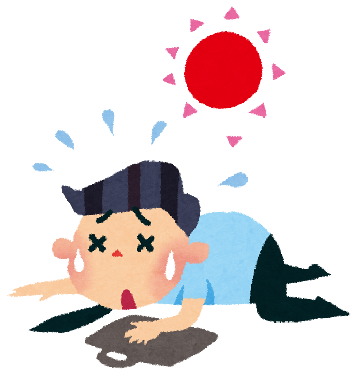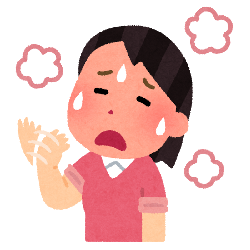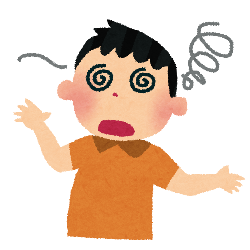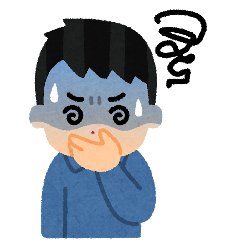Overview of heatstroke 熱中症(ねっちゅうしょう)の概要(がいよう)
最終更新日:2022年5月16日
What is heatstroke? 熱中症(ねっちゅうしょう)とは何(なに)か

When you get heatstroke, your body becomes very hot and you get sick.
In Japan during summer, many people experience heatstroke.
In the past, more than 1,000 people have died due to heatstroke in one year in Japan.
熱中症(ねっちゅうしょう)とは、体(からだ)がとても熱(あつ)くなり、具合(ぐあい)が悪(わる)くなることです。
日本(にほん)では、夏(なつ)になると、多(おお)くの人(ひと)が熱中症(ねっちゅうしょう)になります。
日本(にほん)では、1,000人(にん)以上(いじょう)の人(ひと)が死(し)んだ年(とし)もあります。
Causes 原因(げんいん)
When your body cannot lower its temperature, you get heatstroke.
When you experience (1) to (4) of the following, please be extra careful.
体温(たいおん)を下(さ)げることができなくなると、熱中症(ねっちゅうしょう)になります。
(1)~(4)の時(とき)は、特(とく)に気(き)をつけてください。

(1)Air temperature is high. 気温(きおん)が高(たか)い
Heat is transmitted from a place with a high temperature to a place with a low temperature.
When the air temperature is high, it will be difficult for your body to release heat.
For this reason, your body temperature cannot be lowered properly.
熱(ねつ)は、温度(おんど)の高(たか)いところから低(ひく)いところに移(うつ)ります。
気温(きおん)が高(たか)いと、熱(ねつ)が体(からだ)の外(そと)に移(うつ)りにくいです。
そのため、体温(たいおん)がうまく下(さ)がりません。
(2)Humidity is high. 湿度(しつど)が高(たか)い
When you sweat, your skin is cooled and you feel cool.
However, in a place with high humidity, you do not sweat a lot.
In Japan during summer, humidity is very high.
For this reason, in comparison to countries with low humidity, heat can easily be retained in your body.
汗(あせ)をかくと、肌(はだ)が冷(ひ)えて涼(すず)しくなります。
しかし、湿度(しつど)が高(たか)いところでは、汗(あせ)をかきにくいです。
日本(にほん)の夏(なつ)は、湿度(しつど)がとても高(たか)いです。
空気(くうき)が乾(かわ)いている国(くに)と比(くら)べて、体(からだ)に熱(ねつ)が残(のこ)りやすいです。
(3)Not accustomed to summer heat. 暑(あつ)さに慣(な)れていない
If you live in a cool place, your body is not accustomed to summer heat.
This applies to those who do not often sweat in daily life.
Those who are not accustomed to heat cannot lower their body temperature properly when it suddenly becomes hot.
涼(すず)しいところにいた人(ひと)は、体(からだ)が暑(あつ)さに慣(な)れていません。
毎日(まいにち)の生活(せいかつ)で、汗(あせ)をかくことが少(すく)ない人(ひと)も同(おな)じです。
暑(あつ)さに慣(な)れていない人(ひと)は、急(きゅう)に暑(あつ)くなると、体温(たいおん)をうまく下(さ)げることができません。
(4)When you are not feeling well. 具合(ぐあい)が悪(わる)い
When you cannot get enough sleep, symptoms tend to become severe.
It is the same when you are not feeling well.
Please be extra careful.
よく眠(ねむ)ることができなかった時(とき)は、症状(しょうじょう)がひどくなりやすいです。
体(からだ)の具合(ぐあい)が悪(わる)い時(とき)も同(おな)じです。
特(とく)に気(き)をつけてください。
Symptoms 症状(しょうじょう)
Mild |
You feel dizzy. めまいがする |
|---|---|
Moderate |
Your head aches. 頭(あたま)が痛(いた)い |
Severe |
Your body is hot. 体(からだ)が熱(あつ)い |
The three types are collectively called “Heat disorders”.


When symptoms become severe, it hurts your heart, brain, lungs, kidneys, liver and other organs.
Delayed treatment can lead to death.
Even if your life is saved, it might lead to long-term negative effects for your body.
症状(しょうじょう)がひどくなると、心臓(しんぞう)、脳(のう)、肺(はい)、腎臓(じんぞう)、肝臓(かんぞう)などが傷(きず)つきます。
治療(ちりょう)が遅(おそ)いと、死(し)んでしまうこともあります。
命(いのち)が助(たす)かっても、体(からだ)に悪(わる)い影響(えいきょう)が残(のこ)ることもあります。
People who tend to have severe symptoms. 症状(しょうじょう)がひどくなりやすい人(ひと)
Elderly people 年齢(ねんれい)が高(たか)い人(ひと)
Elderly people tend not to sweat easily.
For this reason, it is difficult to lower body temperature.
Additionally, some people do not feel thirsty or feel hot easily.
Those who do not exercise and stay home should be especially careful.
Symptoms could become severe without you noticing in just a couple of days.

年齢(ねんれい)が高(たか)い人(ひと)は、汗(あせ)をかきにくいです。
そのため、体(からだ)の熱(ねつ)を下(さ)げにくいです。
また、のどが渇(かわ)いたこと、暑(あつ)いことを、感(かん)じにくい人(ひと)もいます。
特(とく)に、運動(うんどう)をしないでずっと家(いえ)の中(なか)にいる人(ひと)は、気(き)をつけてください。
知(し)らないあいだに、何日(なんにち)かかけて、症状(しょうじょう)がひどくなることもあります。
Babies and small children 小(ちい)さい子供(こども)
The body temperature of babies and small children is higher than that of adults.
Additionally, their body’s ability to sweat properly is not yet sufficient, so they have difficulty in lowering their body temperature.
They cannot take off their cloths by themselves to adjust their body temperature properly.

赤(あか)ちゃんや小(ちい)さい子供(こども)は、大人(おとな)と比(くら)べて体温(たいおん)が高(たか)いです。
また、汗(あせ)をかく力(ちから)が弱(よわ)いため、体(からだ)の熱(ねつ)を下(さ)げにくいです。
自分(じぶん)で服(ふく)を脱(ぬ)いで、調節(ちょうせつ)することも、上手(じょうず)にできません。
Those who are sick. 病気(びょうき)の人(ひと)
Those who are sick or have other medical conditions need to be extra careful.
Those with the following diseases or symptoms (1) to (6) should be especially careful:
(1) Diabetes
(2) Heart disease
(3) Kidney disease
(4) Liver disease
(5) Stroke on the brain
(6) Obesity
病気(びょうき)や症状(しょうじょう)がある人(ひと)は、特(とく)に気(き)をつけてください。
たとえば、(1)~(6)の病気(びょうき)や症状(しょうじょう)です。
(1)糖尿病(とうにょうびょう)
(2)心臓病(しんぞうびょう)
(3)腎臓病(じんぞうびょう)
(4)肝臓病(かんぞうびょう)
(5)脳卒中(のうそっちゅう)の後遺症(こういしょう)
(6)肥満(ひまん)
Link リンク
How to prevent heatstroke 熱中症(ねっちゅうしょう)の予防(よぼう)
When you get heatstroke 熱中症(ねっちゅうしょう)になった時(とき)
Hospital information 病院(びょういん)の情報(じょうほう)
Tourism information 観光(かんこう)の情報(じょうほう)
![]() MSD Manual Consumer Version MSDマニュアル(外部サイト)
MSD Manual Consumer Version MSDマニュアル(外部サイト)
お問い合わせ
保健医療部 健康づくり支援課 健康づくり支援担当(川越市総合保健センター内)
〒350-1104 川越市小ケ谷817番地1
電話番号:049-229-4121(直通)
ファクス:049-225-1291






